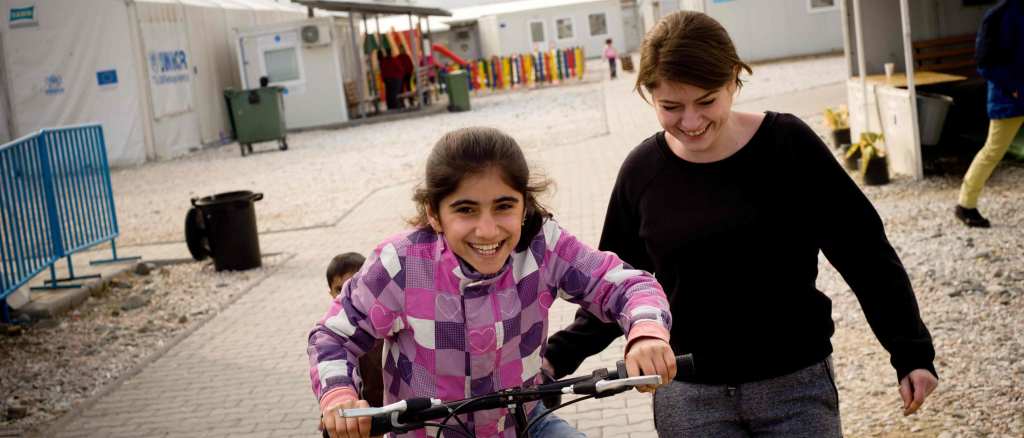
Worldwide, millions of refugees and labor migrants are voting with their feet, seeking to flee economic, social, cultural, and political inequality and violence. In 2015, according to the Migration Policy Centre (Italy), migration replaced the economy and unemployment as Europeans’ main concern. It’s no wonder that migration has become a major subtext of populist campaigns in Europe and the United States—and even their overt focus.
The situation in the Middle East is particularly dire. An estimated 12 million Syrians have fled their homes since the outbreak of the civil war in March 2011. The majority have sought refuge in neighboring countries, with around 5 million in Turkey, Lebanon, Jordan, Egypt, and Iraq. Hundreds of thousands more have requested asylum in Europe. Germany and Sweden are the top receiving countries in the European Union.
Philippe Fargues, founding director of the Migration Policy Centre, calls migration “a reality of all times and all places,” one that presents humanity with “both an opportunity and a challenge.” Among the millions of people whose circumstances compel them to move, refugees are an especially stressed group. But as Fargues suggests, amid the difficulty of their plight, there are opportunities to be found.
What refugees leave behind
It is often argued that the categories of economic migrant and refugee are artificial, because there is significant overlap between them. This may be true in some ways, but there are still important distinctions. Migrants choose to resettle and take some time to plan their lives accordingly. By contrast, refugees flee wars and atrocities that are not of their making and experience crossing borders as an abrupt upheaval of their lives. Refugees leave behind their homes and the experiences and connections that have shaped their identities. They may also leave behind a business, a plot of land, or other kinds of physical assets that define a person’s stature in society.
Young refugees leave school and may lose proof of years of education—thus relinquishing the credentials that forge the path to a decent adulthood. Several INGOs and local NGOs—the International Development Research Centre, the Norwegian Refugee Council, and Catholic Relief Services among them—are exerting tremendous effort to make learning and education accessible to young school-age refugees. Consortia of European, American, and Arab universities, such as the University of Geneva in collaboration with Purdue, MIT, and the Jordanian IDRAAK, offer accredited distance and on-location programs to college-age refugees.
In migrating, no one leaves behind hope for a better future. Still, arduous residency or work permit procedures, and the high fees associated with these permits, add to refugees’ vulnerability as they try to retain assets and start new lives. The experience of being marginalized in a new culture and a range of other threats—including arrest—make it nearly impossible for them to engage in economic and civic life, which is crucial to their ability to contribute to a new country and build a better future.
Recognizing this vulnerability, the International Labour Organization (ILO) and the office of the United Nations High Commissioner for Refugees (UNHCR) are combining efforts to waive fees and reduce the permit requirements for Syrian refugees. UN agencies are overstretched and underfunded, and so they find themselves forced to drastically cut down on allowances to refugees. Fragile as they are, INGOs and local NGOs are trying to fill this gap, but they too have limited means.
Refugees seeking a decent livelihood often meet a political economy characterized by exploitation and bonded labor that affects primarily women and children. Local NGOs and INGOs like Save the Children are working to ensure that people are free to earn decent livelihoods free of exploitation. This means protecting women from the impacts of early marriage, and children from labor.
If the efforts of these organizations and others like them were expanded, they could transform a challenge into an opportunity for the economies of host communities—matching local needs with refugees’ talents and skills and their strong determination to succeed.
Crossing borders of identity and values
Looking in the mirror, a refugee recognizes herself as an educator, artist, engineer, doctor, farmer, or street vendor—identities embedded in her society, attached to a future she can map out. Yet in her new country, far from home, others look at her and see only “refugee.”
The uncertain, even contested, identity of a refugee is further complicated by a polarized political setting. In many societies, the divide between liberal values of inclusion and nationalist populist sentiments has led to polarization—“us” versus “them.” In such a climate, personal fears about stability and security take precedence over what all people have in common: a desire to protect and provide for their families.
Host communities, including those in Europe, have galvanized local civil society to step in and assist. Through programs that transform classrooms, galleries, and other spaces (including those in refugee camps) into places for creativity, problem solving, and inclusion, refugees have been able to regain a sense of individual dignity. In Lebanon, for example, Action for Hope is bringing art and art programs to communities in crisis. To help stimulate refugees’ imaginations, and spur health and growth—as well as to help them manage trauma—the organization connects them with opportunities that include music appreciation, singing lessons, and training in producing animated films.
Opportunities for better governance
The sudden influx of hundreds of thousands of refugees into local communities puts strain on local and national social services. And as Dr. Mona Fawaz, associate professor of urban planning and studies at the American University of Beirut, explains, “We have to be ready to say at some point that the capacity of a neighborhood has been reached.”
To take one example: In a neighborhood in Beirut, Lebanon, a sudden increase in Syrian refugees has put a significant burden on local services. Garbage increased from 120,000 to 170,000 tons per day, but the city was not authorized to buy more garbage trucks. There was an immediate need for more security, with Syrian women and children under particular threats of violence, and local police were unable or unwilling to intervene. Rents rose steeply, putting financial pressure on families and forcing several to share a dwelling. Yet the city was powerless to regulate the number of people living in a housing unit, the quality of the housing, or the cleanliness of the neighborhood.
In situations like this, governance at the municipal level has an important role to play. Good city councils can help connect migrants and refugees to services, creating safer, more inclusive communities. When city councils are empowered to intervene, they are able to enact changes that improve the lives of the people in the host community and the migrants who have settled there. For this to happen, city councils need enhanced capacity, powers, and accountability. Civil society could also play a constructive role, engaging with city councils to find and implement alternatives to the imposition of ad hoc fees, curfews, and other restrictions on refugees’ mobility, housing, and livelihoods. UN Habitat’s regional office in the Arab States region is compiling a guide to help city councilors understand how to best address the influx of refugees.
Telling the truth about migration
So it is true that mass mobility strains local services, especially in countries with weak economies. And deep structural economic and political inequalities provide fuel for national populist movements. That makes it imperative to find ways to reconnect nationalism with universal values, and to do so with sensitivity—to underscore the value of dignity for all people while also respecting the national values of host communities.
This requires working closely with refugee and host communities to communicate the truth and and dispel myths. One common misconception is that refugees take jobs away from host community citizens. In fact, one of the first in-depth investigations into the impact migrants and refugees have on European host communities found that newcomers yield significant economic benefits. According to the report, refugees significantly increase demand for services and products, create jobs, and fill gaps in the workforce—thus repaying European spending on them nearly twice within five years. The American University in Beirut and other regional and local research centers and networks of litigators are working to highlight other opportunities that refugees bring to the Arab region—beyond the more widely known challenges.
Dispelling myths can also be an opportunity to galvanize global citizenry. As Oussama Rifahi, former executive director of AFAC, the Arab Fund for Arts and Culture, explains, “Through the universal language of culture, radicalization, intolerance, and fear can be addressed in a profound and concerted effort to allow us to rally global citizens to responsible and constructive action.” To help artists do this, several arts spaces are developing cross-border programs. AFAC is taking the lead as an Arab institution in developing a new program to address issues related to the arrival in Europe of hundreds of thousands of refugees fleeing political strife. Through carefully selected partnerships with institutions, foundations, and other groups, AFAC is developing cross-cultural programs that foreground exchange and collaboration with European artists and audiences. The same desire informs the work of Studio Emad Eddin, which aims to enhance the presence of Arab artists in flagship European festivals.
Hope for the future
While people migrate for different reasons, forced migration triggered by wars and atrocities is an affront to humanity and must be stopped—and this can happen only by addressing root causes like inequality, injustice, and war. And yet more broadly speaking, migration is not a temporary crisis: It is an integral part of human history. To contend with it effectively, we need to foster knowledge and policy solutions that ensure refugees’ dignity and help build their skills, talents, and assets—and give them hope for a future where they and their families can live full lives and contribute to their new communities.
From our #InequalityIs video series: Michael Clemens, senior fellow at the Center for Global Development, says that effective migration policy must consider the long-term benefits of welcoming refugees, along with the upfront costs. He believes today’s migration crisis is being compounded by a lack of vision.
Accessibility Statement
- All videos produced by the Ford Foundation since 2020 include captions and downloadable transcripts. For videos where visuals require additional understanding, we offer audio-described versions.
- We are continuing to make videos produced prior to 2020 accessible.
- Videos from third-party sources (those not produced by the Ford Foundation) may not have captions, accessible transcripts, or audio descriptions.
- To improve accessibility beyond our site, we’ve created a free video accessibility WordPress plug-in.
